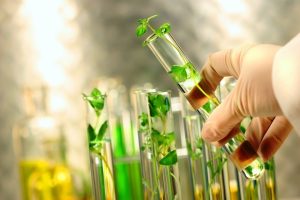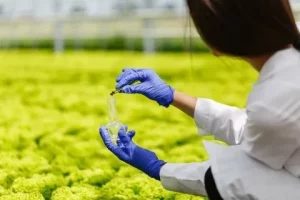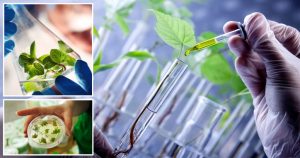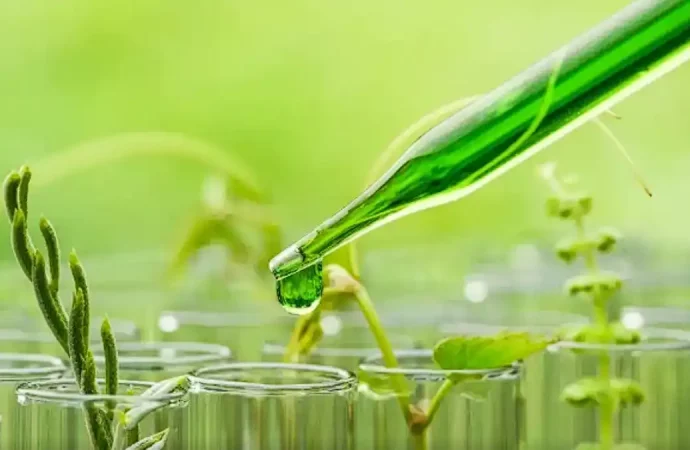Understanding Biotechnology: A Transformative Force for the Future Biotechnology is a powerful field that bridges the world of biology and technology, allowing us to manipulate living organisms to address real-world challenges. Over the years, biotechnology has evolved into a dynamic industry that influences a wide range of sectors including healthcare, agriculture, industrial manufacturing, and environmental
Understanding Biotechnology: A Transformative Force for the Future
Biotechnology is a powerful field that bridges the world of biology and technology, allowing us to manipulate living organisms to address real-world challenges. Over the years, biotechnology has evolved into a dynamic industry that influences a wide range of sectors including healthcare, agriculture, industrial manufacturing, and environmental conservation. From life-saving treatments to eco-friendly solutions, biotechnology is paving the way for a brighter, healthier, and more sustainable future.
In this article, we will explore the latest advancements in biotechnology, how these innovations are benefiting various industries, and the exciting potential of biotechnology in shaping the world to come.
1. Introduction to Biotechnology

Image by Yandex.com
Biotechnology, at its core, refers to the use of biological processes, organisms, or systems to develop products and technologies that improve human life. The field spans several applications, ranging from healthcare (such as gene therapies and vaccines) to agriculture (such as genetically modified crops), to industrial applications (such as biofuels and biodegradable plastics).
By leveraging the natural processes found in biology, biotechnology offers innovative solutions that address pressing global issues like disease, food security, and environmental sustainability. As science continues to progress, biotechnology is becoming an indispensable tool for solving complex problems and creating more efficient, eco-friendly alternatives.
2. CRISPR-Cas9: The Gene-Editing Revolution
One of the most groundbreaking advances in biotechnology in recent years has been the development of CRISPR-Cas9 technology. CRISPR is a revolutionary tool that enables scientists to edit genes with unprecedented precision. It allows for targeted changes in DNA, offering the potential to cure genetic disorders, enhance agricultural crops, and even combat certain diseases.
Medical Applications of CRISPR
In the healthcare sector, CRISPR holds tremendous promise. It is being investigated as a way to treat genetic conditions such as sickle cell anemia, cystic fibrosis, and muscular dystrophy. For example, researchers have successfully used CRISPR to modify immune cells in patients with sickle cell disease, allowing them to produce healthy red blood cells. This gene-editing breakthrough could provide a long-term cure for those with genetic blood disorders.
Agricultural Advancements
In agriculture, CRISPR is being used to develop crops that are more resistant to diseases, pests, and environmental stressors like drought. For instance, scientists have already used CRISPR to create rice strains that are resistant to bacterial infections, significantly improving crop yields in affected areas. The ability to edit the genes of crops could also lead to more nutritious and faster-growing food varieties, which could help address global food shortages.
3. Personalized Medicine and Precision Healthcare
One of the most exciting developments in biotechnology is the rise of personalized medicine, where treatments are tailored to an individual’s genetic makeup. Advances in genomics and biotechnology have made it possible for healthcare providers to offer more precise treatments, leading to better outcomes for patients.
How Personalized Medicine Works
Personalized medicine uses genetic data, along with other biological markers, to determine the most effective treatment plan for an individual. For example, in cancer treatment, doctors can now use genetic testing to identify specific mutations in cancer cells and select the most effective drug for treatment. This approach minimizes side effects and increases the chances of success compared to traditional “one-size-fits-all” treatments.
Examples of Personalized Medicine
A notable example of personalized medicine is the use of CAR-T cell therapy for treating certain cancers like leukemia and lymphoma. In this therapy, a patient’s own T-cells are extracted, modified to better fight cancer, and then reintroduced into the body. This technique has shown incredible success in patients who have not responded to traditional treatments.
4. Biomanufacturing: Green and Sustainable Solutions
Biotechnology is also making waves in industrial manufacturing, where it is helping to create more sustainable and eco-friendly solutions. Traditional manufacturing methods often involve the use of harmful chemicals, high energy consumption, and waste production. Biotechnology, on the other hand, offers greener alternatives that have a smaller environmental footprint.
Biofuels and Renewable Energy
One of the most notable areas where biotechnology is creating sustainable solutions is in biofuel production. Scientists are developing biofuels from algae, sugarcane, and other plant-based materials. These biofuels are renewable and produce fewer greenhouse gases compared to traditional fossil fuels, making them a key part of efforts to combat climate change.
Biodegradable Plastics
Biotechnology is also being used to develop biodegradable plastics, which break down more quickly in the environment and reduce long-term pollution. For instance, bioplastics made from renewable resources like corn or sugarcane are now being produced as a more sustainable alternative to petroleum-based plastics.
5. Stem Cell Research and Regenerative Medicine

Image by Yandex.com
Stem cell research has long been a cornerstone of regenerative medicine, with the potential to treat a wide variety of diseases and injuries by repairing or replacing damaged tissues. Stem cells are unique because they can develop into many different types of cells, making them invaluable in regenerating damaged organs or tissues.
Tissue Engineering and Organ Regeneration
Recent advancements in stem cell technology have enabled scientists to grow tissues and even entire organs in the lab. Researchers are working on growing organs like hearts, livers, and kidneys from stem cells, which could one day eliminate the need for organ transplants. This development holds particular promise for patients with end-stage organ failure who are on long waiting lists for a donor organ.
Regenerative Therapies for Diseases
Stem cells are also being used to treat a range of degenerative diseases such as Parkinson’s disease, spinal cord injuries, and age-related macular degeneration. By injecting stem cells into damaged tissues, doctors can potentially promote healing and restore function, offering hope for conditions that currently have no cure.
6. AI and Machine Learning in Biotechnology
Artificial intelligence (AI) and machine learning (ML) are becoming integral tools in biotechnology. These technologies allow scientists to process large datasets and make predictions that were previously impossible. AI is now being used in areas such as drug discovery, medical diagnostics, and the optimization of biomanufacturing processes.
AI in Drug Discovery
One of the most significant uses of AI in biotechnology is in drug discovery. AI systems can analyze vast amounts of biological data to identify potential drug candidates and predict how different compounds will interact with biological systems. This reduces the time and cost of bringing new drugs to market. For example, AI was instrumental in accelerating the development of the COVID-19 vaccines by predicting how certain molecules could interact with the virus.
Predictive Diagnostics
AI is also improving diagnostics by enabling more accurate and earlier detection of diseases. Machine learning algorithms can analyze medical images, genetic data, and patient records to identify signs of disease before symptoms even appear, allowing for more effective and timely treatment.
7. Biotechnology’s Role in Modern Agriculture

Image by Yandex.com
Agriculture is another field being transformed by biotechnology, especially in the face of growing global populations and climate change. Biotechnology is helping to create more resilient crops, reduce the environmental impact of farming, and increase food security.
Genetically Modified Crops
Genetically modified (GM) crops have been engineered to be more resistant to pests, diseases, and extreme weather conditions. For example, genetically modified cotton and maize are now used worldwide to reduce crop losses due to pests. Additionally, genetically modified crops can be designed to improve nutritional content, such as golden rice, which is fortified with vitamin A to combat malnutrition in developing countries.
Precision Agriculture
Precision agriculture uses biotechnology alongside advanced data analytics and Internet of Things (IoT) technologies to optimize farming practices. This allows farmers to monitor and manage variables like soil moisture, nutrient levels, and pest populations more effectively, reducing waste and increasing crop yields.
8. Advancements in Vaccine Development
The COVID-19 pandemic has highlighted the critical role biotechnology plays in public health. The development of mRNA vaccines marked a turning point in vaccine technology, enabling rapid development and deployment during a global health crisis.
mRNA Vaccines and Beyond
mRNA vaccines, such as those developed for COVID-19 by Pfizer-BioNTech and Moderna, have proven to be highly effective. These vaccines work by instructing cells to produce a piece of the virus’s spike protein, which then triggers an immune response. Beyond COVID-19, mRNA technology is being explored for vaccines against diseases like HIV, Zika, and cancer.
Cancer Vaccines
Researchers are also investigating the use of vaccines to treat cancer. These vaccines would work by stimulating the immune system to attack cancer cells, offering a new way to prevent or even treat cancer without the need for chemotherapy or radiation.
9. Synthetic Biology and Bioinformatics
Synthetic biology is a cutting-edge field that combines biology, engineering, and computer science to create new, customized biological systems. Bioinformatics, on the other hand, uses computational tools to analyze and interpret biological data, helping to unlock new insights into genetics, diseases, and biological systems.
Creating New Organisms and Products
In synthetic biology, scientists are designing microorganisms that can perform specific tasks, such as producing pharmaceuticals, biofuels, or other valuable compounds. This could lead to the creation of entirely new organisms designed to solve particular environmental or industrial problems.
Advancements in Bioinformatics
Bioinformatics has become essential in managing and interpreting the vast amounts of data generated by genomics, proteomics, and other biological fields. This helps researchers uncover patterns and connections that can lead to new treatments, vaccines, and more efficient biomanufacturing processes.
10. Ethical and Regulatory Considerations in Biotechnology
As biotechnology continues to advance, it raises several ethical and regulatory concerns that must be carefully considered.
Ethical Issues
The ethical implications of biotechnology include questions around genetic modification, gene editing, and the potential risks of creating new life forms. The ability to edit genes through technologies like CRISPR raises questions about whether it is ethical to alter the human genome or create genetically modified organisms (GMOs). These issues require ongoing discussions between scientists, ethicists, and policymakers.
Regulation and Safety
As the biotech industry grows, so does the need for robust regulation to ensure safety and efficacy. Governments and regulatory agencies are working to develop guidelines for the safe use of biotechnology, including the approval of genetically modified crops, gene therapies, and new medical treatments.
Conclusion
Biotechnology is undoubtedly one of the most transformative fields of modern science, with applications that touch nearly every aspect of our lives. From revolutionizing healthcare with personalized treatments and gene therapies to advancing sustainable practices in agriculture and manufacturing, biotechnology is shaping the future. As we continue to explore its potential, it is essential to balance innovation with ethical responsibility and safety to ensure these advancements benefit society as a whole.
FAQs About Biotechnology
1. What is biotechnology?
Biotechnology is the use of living organisms, cells, and biological systems to create products or solve problems, especially in healthcare, agriculture, and industry.
2. How does CRISPR work?
CRISPR is a gene-editing technology that allows precise modifications of DNA, enabling potential treatments for genetic disorders and improvements in crops.
3. What is personalized medicine?
Personalized medicine tailors medical treatments to an individual’s genetic makeup, ensuring more effective and targeted therapies.
4. How is biotechnology used in agriculture?
Biotechnology is used to develop genetically modified crops that are more resistant to pests, diseases, and environmental stresses, improving food security.
5. What are the ethical concerns in biotechnology?
Ethical concerns include genetic modification, the safety of GMOs, and the use of gene editing technologies like CRISPR in humans.
















